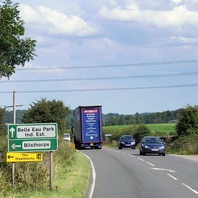
Viking Names
Bilsthorpe
Bilsthorpe, in the Bassetlaw Wapentake of Nottinghamshire, comes from the Old Norse male personal name Bildr and Old Norse þorp ‘a secondary settlement, a dependent outlying farmstead or hamlet’.
Read More
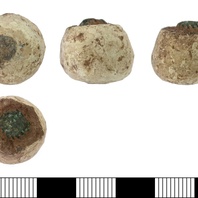
Viking Objects
Spherical Lead-Alloy Weight (DENO-650DB1)
This is a cast lead-alloy weight with a copper alloy Anglo-Saxon pin embedded in the centre. The base features a flattened copper alloy circular area that may be the worn remains of another embedded object. This piece demonstrates Anglo-Scandinavian reuse and repurposing of Anglo-Saxon metalwork. It has also been suggested that this item was a gaming piece although it does not resemble other known gaming pieces. Weights are an important form of evidence for Viking Age commerce and the use of standards across the different economic systems within which Vikings were integrated. Many of the weights discovered, particularly ones in Ireland and those of Arabic type, suggest that a standardized system of weights existed in some areas. These standard weights, alongside standard values of silver, are what allowed the bullion economy of Viking-occupied areas to function. A bullion economy was a barter economy that relied on the exchange of set amounts of precious metal in various forms, such as arm-rings or coins, for tradeable goods, such as food or textiles. Each merchant would have brought their own set of weights and scales to a transaction to make sure that the trade was conducted fairly.
Read More
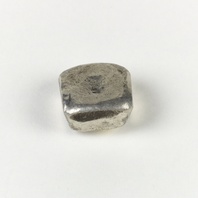
Viking Objects
Reproduction Square Weight
A square lead alloy weight based on one found in Nottinghamshire. It weighs 20g.
Read More
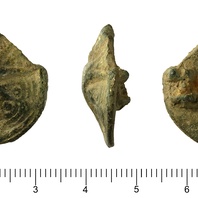
Viking Objects
Copper-Alloy Borre-Style Brooch (SWYOR-A257A6)
A Scandinavian copper-alloy Borre-style convex disc brooch decorated with three inward-looking Borre-style animal heads separated by wedge-shaped arms. Identified as Jansson type II A1 by Jane Kershaw. For more information on Scandinavian jewellery in England check out our blog: Brooches, Pendants and Pins: Scandinavian Dress Accessories in England.
Read More
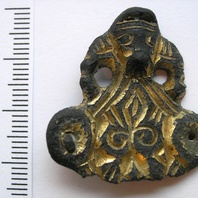
Viking Objects
Equal-Armed Brooch (SWYOR-50BAF5)
A fragment of a Viking Age equal-armed brooch found at Harworth Bircotes, Nottinghamshire. This fragment is the terminal of the brooch and resembles brooches found at Birka, Sweden. Its decoration consists of a Borre style animal with gripping arms or legs. This is one of only six Scandinavian, Viking period equal-armed brooches recorded in England. For more information on Scandinavian jewellery in England check out our blog: Brooches, Pendants and Pins: Scandinavian Dress Accessories in England.
Read More
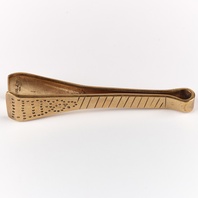
Viking Objects
Reproduction Tweezers
Tweezers were an essential toilet item for the Vikings and most people would have had their own. They could be highly decorated as were many personal possessions. They would have been carried suspended from a brooch or belt.
Read More
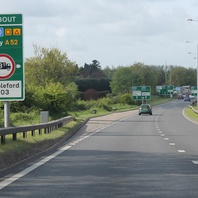
Viking Names
Toton
The name of Toton, in the Broxtow Wapentake of Nottinghamshire, comes from the Old Norse male personal name Tófi and the Old English element tun ‘farm, settlement’. It is thus a hybrid name, like others in the region. There are several examples in the Trent valley such as Gonalston or Rolleston. Such names are often called Grimston-hybrids, but the late Kenneth Cameron, formerly professor at the University of Nottingham, always preferred the term Toton-hybrids, since the element ‘Grim’ does not always derive from an Old Norse personal name.
Read More
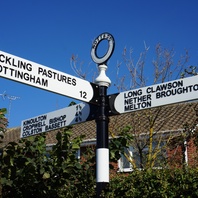
Viking Names
Colston Bassett
Colston, in the Bingham Wapentake of Nottinghamshire, comes from the Old Norse male personal name Kolr and the Old English element tun ‘farm, settlement’. It is thus a hybrid name like others nearby, such as Thoroton and Aslockton. Bassett was added in the twelfth or thirteenth century from the name of an owner of the manor. Such suffixes were used to distinguish this Colston from Car Colston, some eight miles to the north of Colston Bassett.
Read More
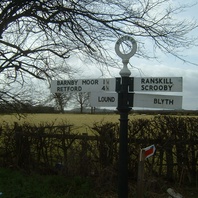
Viking Names
Barnby Moor
Barnby, in the Bassetlaw Wapentake of Nottinghamshire, probably comes from the Old Norse elements barn ‘child’ and by ‘farm, settlement’. Its meaning, ‘children’s farm’, may indicate joint inheritance by the offspring. However, it is also possible that the first element is from the Old Norse male personal name Barni.
Read More
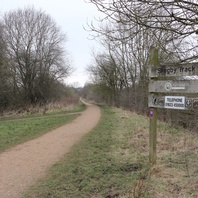
Viking Names
Skegby
Skegby, in the Broxtow Wapentake of Nottinghamshire, comes from the Old Norse male personal name Skeggi ‘the bearded one’ and by ‘a farmstead, a village’.
Read More

Viking Names
Scrooby
The name of Scrooby probably comes from the Old Norse female personal name Skroppa and the Old Norse element by ‘farm, settlement’.
